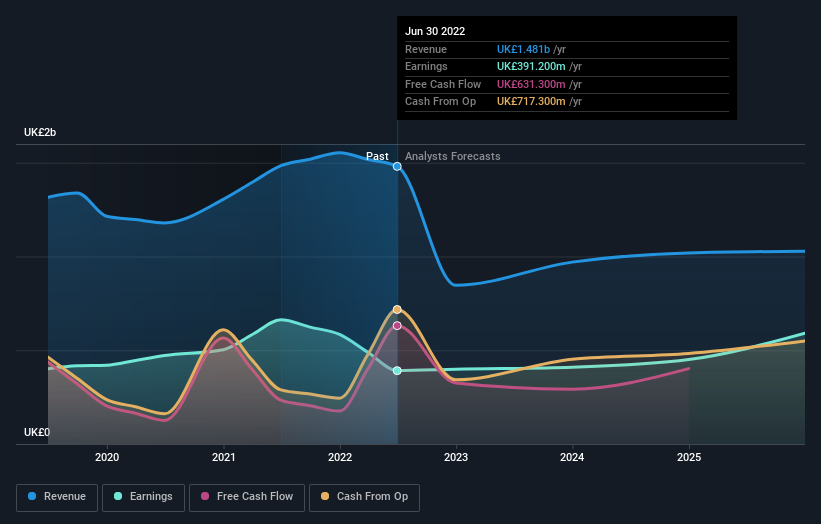- United Kingdom
- /
- Insurance
- /
- LSE:ADM
Institutional owners may take dramatic actions as Admiral Group plc's (LON:ADM) recent 6.8% drop adds to one-year losses

Key Insights
- Given the large stake in the stock by institutions, Admiral Group's stock price might be vulnerable to their trading decisions
- 51% of the business is held by the top 15 shareholders
- Analyst forecasts along with ownership data serve to give a strong idea about prospects for a business
A look at the shareholders of Admiral Group plc (LON:ADM) can tell us which group is most powerful. With 75% stake, institutions possess the maximum shares in the company. In other words, the group stands to gain the most (or lose the most) from their investment into the company.
As a result, institutional investors endured the highest losses last week after market cap fell by UK£439m. Needless to say, the recent loss which further adds to the one-year loss to shareholders of 9.3% might not go down well especially with this category of shareholders. Institutions or "liquidity providers" control large sums of money and therefore, these types of investors usually have a lot of influence over stock price movements. Hence, if weakness in Admiral Group's share price continues, institutional investors may feel compelled to sell the stock, which might not be ideal for individual investors.
Let's delve deeper into each type of owner of Admiral Group, beginning with the chart below.
See our latest analysis for Admiral Group

What Does The Institutional Ownership Tell Us About Admiral Group?
Institutional investors commonly compare their own returns to the returns of a commonly followed index. So they generally do consider buying larger companies that are included in the relevant benchmark index.
Admiral Group already has institutions on the share registry. Indeed, they own a respectable stake in the company. This implies the analysts working for those institutions have looked at the stock and they like it. But just like anyone else, they could be wrong. When multiple institutions own a stock, there's always a risk that they are in a 'crowded trade'. When such a trade goes wrong, multiple parties may compete to sell stock fast. This risk is higher in a company without a history of growth. You can see Admiral Group's historic earnings and revenue below, but keep in mind there's always more to the story.

Institutional investors own over 50% of the company, so together than can probably strongly influence board decisions. Hedge funds don't have many shares in Admiral Group. Henry Engelhardt is currently the company's largest shareholder with 8.5% of shares outstanding. In comparison, the second and third largest shareholders hold about 7.2% and 5.0% of the stock.
A closer look at our ownership figures suggests that the top 15 shareholders have a combined ownership of 51% implying that no single shareholder has a majority.
While it makes sense to study institutional ownership data for a company, it also makes sense to study analyst sentiments to know which way the wind is blowing. There are plenty of analysts covering the stock, so it might be worth seeing what they are forecasting, too.
Insider Ownership Of Admiral Group
While the precise definition of an insider can be subjective, almost everyone considers board members to be insiders. Company management run the business, but the CEO will answer to the board, even if he or she is a member of it.
Insider ownership is positive when it signals leadership are thinking like the true owners of the company. However, high insider ownership can also give immense power to a small group within the company. This can be negative in some circumstances.
Shareholders would probably be interested to learn that insiders own shares in Admiral Group plc. This is a big company, so it is good to see this level of alignment. Insiders own UK£519m worth of shares (at current prices). If you would like to explore the question of insider alignment, you can click here to see if insiders have been buying or selling.
General Public Ownership
The general public-- including retail investors -- own 15% stake in the company, and hence can't easily be ignored. While this group can't necessarily call the shots, it can certainly have a real influence on how the company is run.
Next Steps:
I find it very interesting to look at who exactly owns a company. But to truly gain insight, we need to consider other information, too. Be aware that Admiral Group is showing 3 warning signs in our investment analysis , you should know about...
If you are like me, you may want to think about whether this company will grow or shrink. Luckily, you can check this free report showing analyst forecasts for its future.
NB: Figures in this article are calculated using data from the last twelve months, which refer to the 12-month period ending on the last date of the month the financial statement is dated. This may not be consistent with full year annual report figures.
New: Manage All Your Stock Portfolios in One Place
We've created the ultimate portfolio companion for stock investors, and it's free.
• Connect an unlimited number of Portfolios and see your total in one currency
• Be alerted to new Warning Signs or Risks via email or mobile
• Track the Fair Value of your stocks
Have feedback on this article? Concerned about the content? Get in touch with us directly. Alternatively, email editorial-team (at) simplywallst.com.
This article by Simply Wall St is general in nature. We provide commentary based on historical data and analyst forecasts only using an unbiased methodology and our articles are not intended to be financial advice. It does not constitute a recommendation to buy or sell any stock, and does not take account of your objectives, or your financial situation. We aim to bring you long-term focused analysis driven by fundamental data. Note that our analysis may not factor in the latest price-sensitive company announcements or qualitative material. Simply Wall St has no position in any stocks mentioned.
About LSE:ADM
Admiral Group
A financial services company, provides insurance and personal lending products in the United Kingdom, France, Italy, Spain, and the United States.
Proven track record with adequate balance sheet.
Similar Companies
Market Insights
Community Narratives



